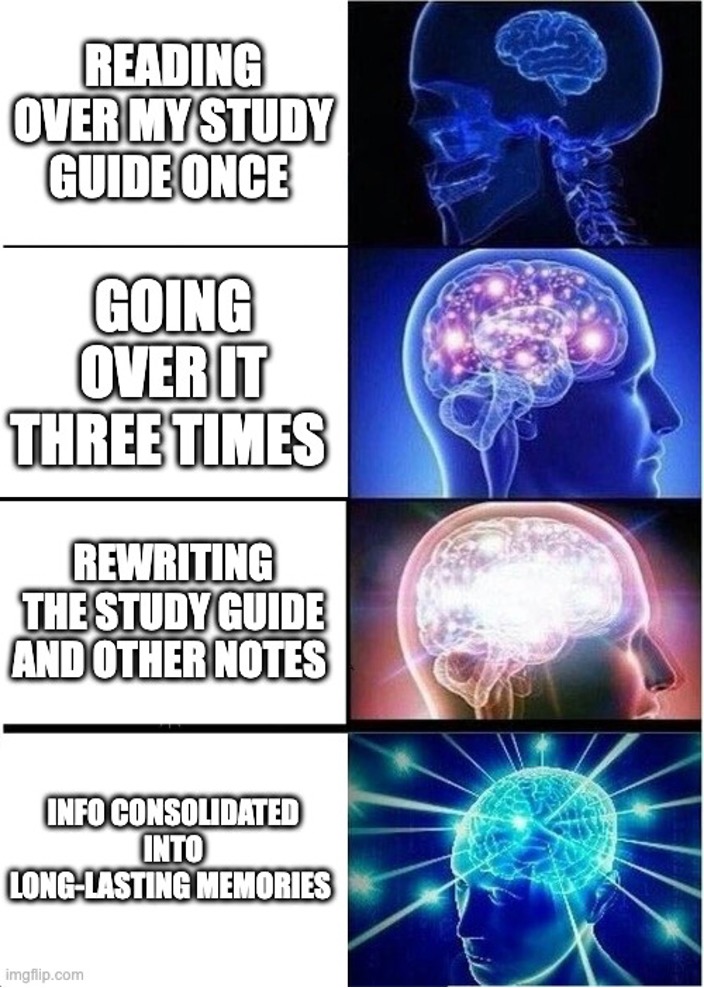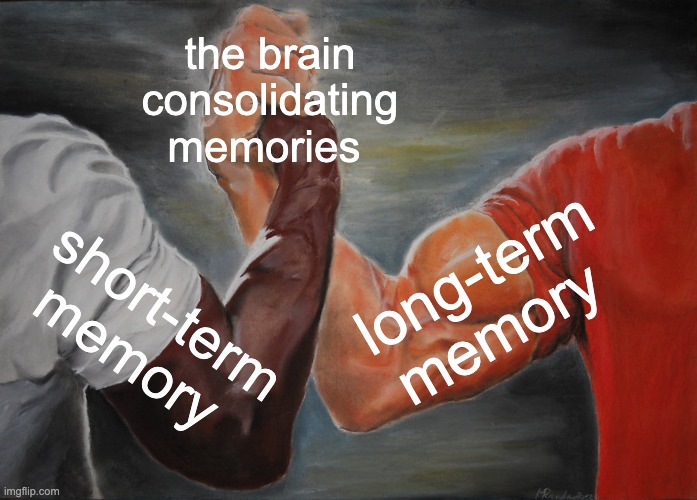By Frannie Heckman
Memories are a huge factor in learning, studying, and just your everyday life as student. Learning the processes of memories and how certain memories become short-term and some become long-term, where they are in your brain, and learning how sleep can affect you, can actually be a benefit for studying and your future GPA. While studying many students just take in as much information as possible in a short amount of time this is not always the best method. Consolidation process of memories is transforming them into a more stable, longer- lasting form. (1) This can also be helpful to students to get the information they need while having it last longer in the process.

The process of consolidation occurs in the hippocampus and neocortex of the brain. The hippocampus is the place for reorganizing and storing information and memories. The consolidation and storage involve not only the hippocampus but the cortical areas such as the entorhinal and posterior parietal cortices, which are parts of the brain. (2) The prefrontal cortex is also important in focusing attention on the things around to focus for forming memories. (2) If the hippocampus has an injury there is a loss of memory or the loss of the ability to make new ones, called amnesia.
My first source goes into depth about the consolidation process while using neuroimages on people with normal memory. The definition of consolidation of memories is as follows, “Memory consolidation refers to the process by which a temporary, labile memory is transformed into a more stable, long-lasting form.” (1) This journal studies the PET scans and MRIs of a normal memory. These are neuroimages that help us with seeing how the memory works in real time. In this study the researchers were hoping to study if a particular structure of the brain is used when retrieving and consolidating memories. The researchers found that participants had a greater use different parts of the brain like the temporal neocortex, hippocampus, and the medial temporal lobe.
Tying all these things into your learning, there is a process to the consolidation of memories. Encoding, storage, and retrieval are a part of the process of making memories and are crucial steps for consolidation. Encoding is the beginning step in the processing of memories. Encoding memories is the process of learning the information. For example, you are reading a chapter of a book for a class. Storage is the process of maintaining the information over time. This example would be, being able to apply the information during a class period when the professor talks about the chapter in class. Retrieval is the process of accessing that information when needed. This example would be taking a quiz over that chapter. (3) These processes relate to consolidation because without encoding, storage, and retrieval we would not be able to consolidate these memories from short-term to long-term because the memories need to be established before they are able to be consolidated.
Consolidation of memories or information has been widely known to occur during sleep. There are many sources out there proving sleep to be an important factor in memory storage and consolidation. There are also many sources that say college students do not get enough sleep. Scientists believe that information processing and consolidation happen in the hippocampus during the sleep-wake cycle. One journal written by Jan Born and Ines Wilhelm states that consolidation of memories happens during slow-wave sleep. Slow wave sleep is the time of sleep in which the body begins to relax into deep rest. This then indicates that “a) memories are reactivated during sleep to be consolidated, b) the consolidation process during sleep is selective in as much as it does not enhance every memory, c) memories, when transferred to the long-term store undergo qualitive changes.” (4) This all means that when you are in the sleep-wake cycle,[i] memories are being encoded and then consolidated into short-term or long-term memories. This puts even more importance on sleep once you become a college student because getting a good night’s sleep can actually help you study in the long run. If you don’t get through a sleep-wake cycle your information will not be consolidated.
Concerning studying and taking in information during your classes consolidation is an important factor in your brain receiving all this information. You can start using consolidation techniques concerning your content in a certain class. For example, one technique would be rereading over your class notes once a week to greater increase the chance your memory retention. The more frequently you see the information, the stronger the synapses in your brain become. (5) Another example could be making graphic organizers or other visual symbols for studying. Most psychological studying techniques are helpful in the consolidation process.
As an incoming freshman there are many things you need to know about learning, memory and studying. The main takeaways are keeping your brain healthy and getting the recommended hours of sleep. According to Cornell Health, college aged student should be getting at least 7-9 hours of sleep. (6) Finally, find some study techniques that can help you to consolidate those memories into longer-lasting memories.

References:
(1) Squire, L. R., Genzel, L., Wixted, J. T., & Morris, R. G. (2015). Memory consolidation. Cold Spring Harbor Perspectives in Biology, 7(8). https://doi.org/10.1101/cshperspect.a021766
(2) Roesler, R., & McGaugh, J. L. (2010). Memory consolidation. Encyclopedia of Behavioral Neuroscience, 206–214. https://doi.org/10.1016/b978-0-08-045396-5.00147-0
(3) McDermott, K. B., & Roediger, H. L. (n.d.). Memory (encoding, storage, retrieval). Noba. https://nobaproject.com/modules/memory-encoding-storage-retrieval
(4) Born, J., & Wilhelm, I. (2011). System consolidation of memory during sleep. Psychological Research, 76(2), 192–203. https://doi.org/10.1007/s00426-011-0335-6
(5) Kendra Cherry, Mse. (2023, November 6). How consolidation turns short-term memories into long-term ones. Verywell Mind. https://www.verywellmind.com/what-is-memory-consolidation-2795355#:~:text=One%20of%20the%20best%20ways,the%20night%20before%20an%20exam.
(6) Sleep. Cornell Health. (n.d.). https://health.cornell.edu/resources/health-topics/sleep#:~:text=In%20fact%2C%20according%20to%20The,poor%20health%2C%20and%20low%20energy